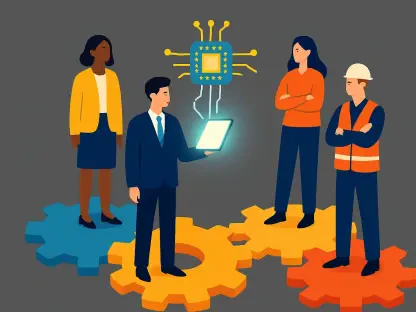Artificial Intelligence has swept into the business world, promising transformative changes that could redefine workforce dynamics. CEOs face a critical challenge: Are they prepared to integrate these revolutionary AI technologies within their organizations seamlessly? As companies embrace the capabilities of AI, they must align their strategies to leverage its potential and mitigate its disruptions.
Unprecedented Changes in the Workplace
In a scenario emblematic of modern business realities, companies are navigating a shift marked by AI’s growing presence. An unexpected revelation from recent studies highlights that 61% of CEOs have already deployed AI agents across their brands or plan to expand them soon. The rapid adoption indicates a significant pivot as leaders balance AI integration with traditional business models, aiming for a streamlined operation that maintains human-centric tasks alongside automated processes.
The Crucial Role of AI Integration
The advancement of AI technologies is swiftly reshaping business landscapes, pushing CEOs to reassess strategies that were once seen as constant. AI’s ability to address skill gaps and improve workforce efficiency is vital amid fierce market competition. The need for enhanced productivity and accelerated business growth has made AI integration more than just an option. CEOs must prioritize AI to ensure their organizations thrive in such a competitive environment, acknowledging its role in boosting efficiencies and driving long-term growth projections.
Navigating the Transformation of the AI Workforce
CEOs are adopting multifaceted strategies to manage these transformations. The “buy, build, bot, borrow” approach combines talent acquisition, upskilling, AI embedding, and external collaborations to tackle talent shortages. IBM’s research shows that nearly one-third of the workforce requires reskilling within the next few years to remain relevant. Successful companies are restructuring roles to enhance human-driven tasks, ultimately building a workforce that seamlessly integrates AI literacy into everyday functions.
Expert Insights on AI Challenges
Industry leaders offer valuable perspectives on overcoming AI integration hurdles. Kim Morick emphasizes that AI integration involves more than simply adopting new tools; it demands a comprehensive approach in evolving work roles and enhancing skills. IBM’s findings illustrate a positive outlook among CEOs regarding AI’s ROI, yet overcoming reskilling obstacles remains a priority. HR leaders share their experiences in facilitating smooth transitions, ensuring employees gain a firm understanding of AI’s implications on their roles and empowering them to embrace these changes confidently.
Preparing for the AI Revolution
To embrace the AI revolution effectively, organizations must implement targeted HR strategies. Tailoring AI training to specific roles is crucial, focusing on data literacy and essential technical skills. Collaborating with team leaders to devise training that aligns with role-specific demands strengthens employees’ confidence, enabling them to navigate AI advancements confidently. Evaluating AI effectiveness comes from analyzing productivity metrics alongside employee feedback on their comfort levels and capabilities, ensuring a successful integration.
Reflecting on the journey into an AI-driven future, companies realize that success in AI integration hinged on collaborative efforts between CEOs and HR leaders. They forged pathways that combined technological prowess with invaluable human skills. As AI reshaped workflows, those equipped with relevant expertise thrived, ensuring both organizational growth and an enriched working environment. This experience underscored the importance of a strategic approach to AI integration, preparing businesses to continue evolving and adapting to future technological advancements.









